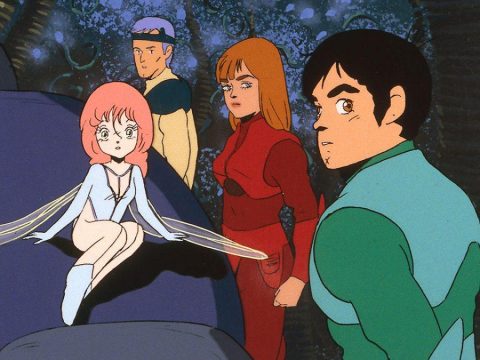GATE brings the military might to a premise that’s both fun to watch and thoughtful in ways you wouldn’t expect.

It’s a tried-and-true premise in movies: One day, our world suddenly finds itself on the receiving end of a massive invasion from otherworldly forces. Whether it’s aliens, giant monsters, demons, or zombies, we’ve already seen enough to figure out that, no matter how ugly things get, the humans find a way to fight back. It’s a plot we’ve seen over and over again, and if that were the whole plot of GATE, we wouldn’t be giving it this much attention. But while the show does start with an invasion, it quickly becomes clear it won’t end like others. As we soon find out, there’s much more to dealing with a foreign force than simply having Jeff Goldblum leave a bomb behind on the alien mothership and call it a day.
A regular day in Tokyo quickly turns upside down when an ancient-looking gate suddenly appears out of thin air, right in the middle of the Ginza district. Before anyone can register its abnormality, all kinds of fantasy beings—dragons, medieval knights, and the like—start pouring out, causing all kinds of mayhem on the streets. And just as quickly as these beings arrive, the Japanese Self-Defense Forces drop in, pushing any knight or ogre they can get their guns on back through the portal, or the Gate, as it later comes to be known.

Shortly after the dust has settled and the mourners have mourned, the Japanese government decides to establish diplomatic relations with the government on the other side and hopefully find those responsible for the massacre. At the center is JSDF soldier and self-admitted otaku Youji Itami, who quickly finds himself in the spotlight after his quick work in getting civilians to safety before his colleagues can arrive. He earns a promotion to First Lieutenant of the Third Reconnaissance Team, which is dispatched to explore the world—one where dragons, elves, and magic are real—that Japan has dubbed their “Special Region.”
The Japanese troops pass through the portal, not entirely sure what to expect on the other side. But Itami, having been to enough dojin conventions, thinks he has a solid idea of what to expect. And he’s actually not that far off: This is indeed a world populated by all kinds of fantasy beings, such as dragons, wizards, cat girls, and bunny warriors. His team is soon joined by the lone survivor of a scorched elf village, a young and intelligent student sorceress, and a superhuman priestess for the god of war and death. They turn out to be valuable allies as Itami’s crew explores the Special Region, all while navigating all kinds of turmoil, both medieval and geopolitical.

This is the premise that drives GATE, a 2015–2016 fantasy anime adaptation of the novel series of the same name, with animation by A-1 Pictures. If any of this sounds like someone tried to turn The Lord of the Rings into a political drama, that’s understandable, but it’s the political background that serves as the foundation of the story that makes it an intriguing watch.7
For one thing, GATE, seems to define the score before it defines the characters. Any scenes involving modern technology are bound to be pretty impressive in terms of just what they’re capable of, considering that the Special Regions appears to still be in a medieval-like era. While the Special Region is a land of fantasy, one where magic is both rare and hard to master, the power of firearms and tanks will overpower swords and shields on any given day. This makes it all a refreshing take, considering how many shows have machines being destroyed by magical abilities. In addition, the show is able to balance an array of serious moments with a nice assortment of light-hearted ones, both types being generated by decently defined characters.
In GATE, Japan’s militaristic presence in the Special Region is more than just an attempt to establish peaceful diplomacy. The country is sending a message to the rest of the world—“Finders, keepers; Losers, weepers.” Any country that isn’t Japan is power hungry and wants to stake a claim in the Special Region before Japan can. It’s a daring form of characterization that comes from the original author, who has gained notoriety for his personal nationalistic views. If there were such an attack on Japanese soil in real life, the USA would step in with complete control over strategic operations to save the day. GATE, however, basically throws this partnership out the window and presents a country with troops that can do no wrong and foreign nations that can do nothing but wrong. It’s a cynical view that’s bound to disturb many a viewer.

So is GATE a depiction of what could be or of something that should be? Granted, the anime does a satisfactory job of toning down the novel’s anti-Western views to catch a larger audience, but you can still catch a glimmer of controversy looming in the show’s methods. A 24-episode series, GATE is an intriguing take on the modern war story and a fantasy that properly does its job.
GATE Complete Collection is available now from Sentai Filmworks/Section23 Films.
This story appears in the December 2017 issue of Otaku USA Magazine. Click here to get a print copy.




![SSSS.Dynazenon [Anime Review] SSSS.Dynazenon [Anime Review]](https://otakuusamagazine.com/wp-content/uploads/2021/08/16-9-SSSS.Dynazenon_Key_Visual_3.5-480x360.jpg)
![Back Arrow [Anime Review] Back Arrow [Anime Review]](https://otakuusamagazine.com/wp-content/uploads/2021/07/ba15-02686-480x360.jpg)
![Dawn of the Witch [Manga Review] Dawn of the Witch [Manga Review]](https://otakuusamagazine.com/wp-content/uploads/2021/07/16-9-DawnoftheWitch-cvr_02-480x360.jpg)
![Nina The Starry Bride [Manga Review] Nina The Starry Bride [Manga Review]](https://otakuusamagazine.com/wp-content/uploads/2021/07/nina-the-starry-bride-v1-16-9-480x360.jpg)